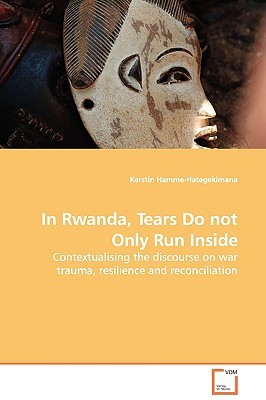
- We will send in 10–14 business days.
- Author: Kerstin Hamme-Hategekimana
- Publisher: VDM Verlag
- ISBN-10: 3639107624
- ISBN-13: 9783639107623
- Format: 15.2 x 22.9 x 0.6 cm, softcover
- Language: English
- SAVE -10% with code: EXTRA
In Rwanda, Tears Do not Only Run Inside - Contextualising the discourse on war trauma, resilience and reconciliation (e-book) (used book) | bookbook.eu
Reviews
Description
Deconstructing the dominant concept of PTSD, the author opens the view on traumatic processes as well as mediating factors that facilitate healing and resilience in the aftermath of massive and collective violence, such as frameworks of psychosocial trauma with a collective and socio-political focus, traumatic stress, grief and non-Western approaches on trauma and mentalhealth. Community based conceptions of war- and trauma views, coping strategies and conflicting perspectives on reconciliation among survivors of sexual violence during the genocide in Rwanda transcend the dichotomy of the discourses on trauma and resilience and reveal non-dominant and sometimes "uncomfortable" insights, like transgenerational cultural trauma (e.g. through the inability to mourn massive loss) and healing capacities through indigenous resources of proverbs, tales and rituals, as well as the need for survivors to freely combine Western and indigenous therapeutic methods. Ecological principles and aspects of community peace psychology suggest that survivors and perpetrators need stability and time to each name their own conflicting narratives which cannot and should not be silenced or unified.
EXTRA 10 % discount with code: EXTRA
The promotion ends in 18d.12:21:32
The discount code is valid when purchasing from 10 €. Discounts do not stack.
- Author: Kerstin Hamme-Hategekimana
- Publisher: VDM Verlag
- ISBN-10: 3639107624
- ISBN-13: 9783639107623
- Format: 15.2 x 22.9 x 0.6 cm, softcover
- Language: English English
Deconstructing the dominant concept of PTSD, the author opens the view on traumatic processes as well as mediating factors that facilitate healing and resilience in the aftermath of massive and collective violence, such as frameworks of psychosocial trauma with a collective and socio-political focus, traumatic stress, grief and non-Western approaches on trauma and mentalhealth. Community based conceptions of war- and trauma views, coping strategies and conflicting perspectives on reconciliation among survivors of sexual violence during the genocide in Rwanda transcend the dichotomy of the discourses on trauma and resilience and reveal non-dominant and sometimes "uncomfortable" insights, like transgenerational cultural trauma (e.g. through the inability to mourn massive loss) and healing capacities through indigenous resources of proverbs, tales and rituals, as well as the need for survivors to freely combine Western and indigenous therapeutic methods. Ecological principles and aspects of community peace psychology suggest that survivors and perpetrators need stability and time to each name their own conflicting narratives which cannot and should not be silenced or unified.


Reviews